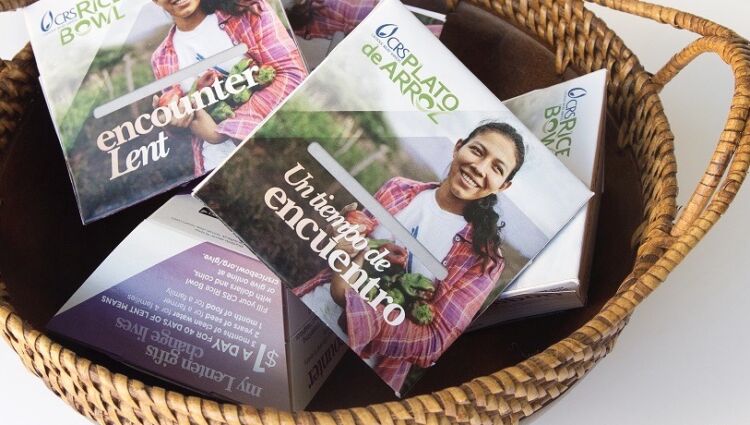
When I consider Lent, the first question that comes to mind is “what should I give up?” Though abstaining from meat, chocolate, alcohol or one of life’s other pleasures certainly has the potential to make for a reflective 40 days, Lent is as much about giving as it is giving up and it’s as important to add things that draw us closer to God and our fellow humans.
In that spirit, my husband and I decided to embark on a Lenten practice this year that would involve combining the three Lenten pillars of fasting, prayer, and almsgiving.
RELATED: 4 Mini-Challenges to Try This Lent
After receiving a “Rice Bowl” from our parish, we committed to donating to Catholic Relief Services the same amount that we personally spent on non-necessities throughout the season of Lent, and to do so with a prayerful spirit. What this looks like in practical terms is that anytime we spend money on something other than rent, groceries, or utilities, we write the amount on a little Post-it and place it — along with a prayer for the most vulnerable people in the world — in the box, and at the end of Lent, we’ll add them up and write a check to CRS.
Here are a few things that I’ve noticed over the course of the Lenten season:
Our lives are full of non-necessities
Because we are naturally frugal people at a phase of life when we don’t have a lot of disposable income (my husband’s a grad student, and I work at a church), I honestly didn’t expect to place too many Post-its in our Rice Bowl. Other than the occasional date night or family outing, I thought we only spent money on necessities. Wow, was I wrong.
Our Lenten practice has made me cognizant of how full our life is with things we don’t technically need, from dusting spray to museum admission to a movie rental. In everyday life, I don’t think twice about these purchases. While museum admission isn’t exactly a necessity, I don’t usually think of it as a luxury so much as a means for fully experiencing my surroundings, whether while at home or on a trip. This Lenten experiment has opened my eyes to the fact that this very perspective is a privilege.
Awareness is the gateway to gratitude
Realizing that we don’t actually need many of our purchases has filled me with gratitude as I’ve recognized how saturated our day-to-day life is with treats. Let’s put it this way: While dusting spray isn’t a bottle of chardonnay, you can just as effectively dust with a water-dampened cloth. I enjoyed my household chores a lot more when I recognized the fresh lemon scent and the shiny glow in which Pledge spray bathed my furniture are simply extra perks.
It’s easier for me to simplify than it is to be generous
This one is a bit painful for me to admit, but here it is: I am much more inclined to give up than to give away. There are certainly benefits to scaling back: Saying “no” to mindless consumption pushes me to examine what hole I’m trying to fill through buying things and going without draws me closer to God as I turn to prayer instead of purchasing. But there’s also something to be said for generosity, or saying “yes” to thoughtful giving. Almsgiving enables us to help others and it typically calls for some form of personal sacrifice, which leads to self-reflection, amongst other things. That moment when I caught myself thinking, “I’d rather forego the take-out burritos than donate an extra $16 to a child in need” was a sobering one.
In this way, our Lenten practice has helped me to consider my life and my attitude. Like an examination of conscience, it’s forcing me to take a good, hard look at myself, and to confront the not-so-pretty (read: stingy) side of myself. Realizing that abstinence comes more naturally to me than generosity has inspired me to err on the side of liberality for the rest of Lent. In other words, I’m not going to say “no” to a treat in which I’d usually indulge (a croissant to share when out on a coffee date, a nicely scented shower gel instead of the 99 cent bar of soap!) just because I know that these little purchases will add to my Post-it-note total.
One of the things that I have most appreciated about our Lenten practice this year is that it has created a fertile ground for reflection. In this way, I think that it gets at the heart of what Lent is about, which is not accomplishing some personal goal, but experiencing something even loftier: a change of heart.
Originally published on April 1, 2020.